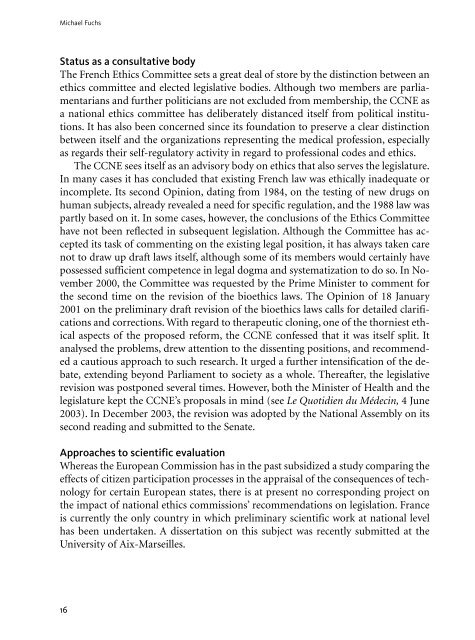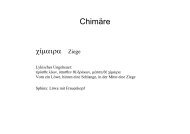Michael Fuchs National ethics councils - Deutscher Ethikrat
Michael Fuchs National ethics councils - Deutscher Ethikrat
Michael Fuchs National ethics councils - Deutscher Ethikrat
You also want an ePaper? Increase the reach of your titles
YUMPU automatically turns print PDFs into web optimized ePapers that Google loves.
<strong>Michael</strong> <strong>Fuchs</strong> <strong>National</strong> <strong>ethics</strong> <strong>councils</strong>. Their backgrounds, functions and modes of operation compared<br />
Status as a consultative body<br />
The French Ethics Committee sets a great deal of store by the distinction between an<br />
<strong>ethics</strong> committee and elected legislative bodies. Although two members are parliamentarians<br />
and further politicians are not excluded from membership, the CCNE as<br />
a national <strong>ethics</strong> committee has deliberately distanced itself from political institutions.<br />
It has also been concerned since its foundation to preserve a clear distinction<br />
between itself and the organizations representing the medical profession, especially<br />
as regards their self-regulatory activity in regard to professional codes and <strong>ethics</strong>.<br />
The CCNE sees itself as an advisory body on <strong>ethics</strong> that also serves the legislature.<br />
In many cases it has concluded that existing French law was ethically inadequate or<br />
incomplete. Its second Opinion, dating from 1984, on the testing of new drugs on<br />
human subjects, already revealed a need for specific regulation, and the 1988 law was<br />
partly based on it. In some cases, however, the conclusions of the Ethics Committee<br />
have not been reflected in subsequent legislation. Although the Committee has accepted<br />
its task of commenting on the existing legal position, it has always taken care<br />
not to draw up draft laws itself, although some of its members would certainly have<br />
possessed sufficient competence in legal dogma and systematization to do so. In November<br />
2000, the Committee was requested by the Prime Minister to comment for<br />
the second time on the revision of the bio<strong>ethics</strong> laws. The Opinion of 18 January<br />
2001 on the preliminary draft revision of the bio<strong>ethics</strong> laws calls for detailed clarifications<br />
and corrections. With regard to therapeutic cloning, one of the thorniest ethical<br />
aspects of the proposed reform, the CCNE confessed that it was itself split. It<br />
analysed the problems, drew attention to the dissenting positions, and recommended<br />
a cautious approach to such research. It urged a further intensification of the debate,<br />
extending beyond Parliament to society as a whole. Thereafter, the legislative<br />
revision was postponed several times. However, both the Minister of Health and the<br />
legislature kept the CCNE’s proposals in mind (see Le Quotidien du Médecin, 4 June<br />
2003). In December 2003, the revision was adopted by the <strong>National</strong> Assembly on its<br />
second reading and submitted to the Senate.<br />
Approaches to scientific evaluation<br />
Whereas the European Commission has in the past subsidized a study comparing the<br />
effects of citizen participation processes in the appraisal of the consequences of technology<br />
for certain European states, there is at present no corresponding project on<br />
the impact of national <strong>ethics</strong> commissions’ recommendations on legislation. France<br />
is currently the only country in which preliminary scientific work at national level<br />
has been undertaken. A dissertation on this subject was recently submitted at the<br />
University of Aix-Marseilles.<br />
16<br />
Transparency and public participation<br />
The CCNE’s Avis are published at press conferences, which are held four or five times<br />
a year. Furthermore, as required by the founding decree, a conference, for which the<br />
Committee is responsible, is held annually. Several different types of events providing<br />
for public participation have been developed.<br />
In addition to wide-ranging documentation on the Internet, the Committee publishes<br />
a quarterly journal (Les Cahiers du Comité Consultatif <strong>National</strong> d’Ethique).<br />
Under the heading Rubrique internationale it regularly presents reports and news of<br />
international and European meetings of national <strong>ethics</strong> committees and of the activities<br />
of other national <strong>ethics</strong> bodies. Although no claim is made to completeness, information<br />
that would otherwise be relatively inaccessible can be found here, for<br />
instance on the work of the Algerian or Tunisian committees or on that of Luxembourg.<br />
Website<br />
CCNE: http://www.ccne-ethique.fr<br />
Bibliography<br />
Ambroselli, C. (1988). Les journées annuelles d’éthique 1987. Présentation. In: Comités d’éthique à travers le<br />
monde. 2, recherches en cours 1987. Paris: 83.<br />
Byk, Chr.; Mémeteau, G. (1996). Le droit des comités d’éthique (Collection “Médecine et droit”). Paris.<br />
Changeux, J.-P. (1994). The Role and Functioning of the <strong>National</strong> Consultative Ethics Committee in France.<br />
In: Council of Europe (ed.). Standing Conference of European Ethics Committees. Proceedings, Stockholm<br />
8 – 9 April 1994: 100 – 106.<br />
Chirac, J. (2003). Discours de Monsieur Jacques Chirac, Président de la République, à l’occasion du 20e<br />
anniversaire du Comité consultatif national d’éthique pour les sciences de la vie et de la santé. Les cahiers<br />
du Comité consultatif national d’éthique pour les sciences de la vie et de la santé 35: 27 – 30.<br />
CCNE (1984). Avis sur les prélèvements de tissus d’embryons et de foetus humains morts, à des fins<br />
thérapeutiques, diagnostiques et scientifiques (Avis n° 1 – 22 mai 1984).<br />
CCNE (1987). Décret de création, n° 83 – 132, 23 février 1983. In: Comités d’éthique à travers le monde.<br />
1, recherches en cours 1986. Paris: 79 – 84.<br />
CCNE (1989). Avis sur les greffes de cellules nerveuses dans le traitement de la maladie de Parkinson<br />
(Avis n° 16 – 16 octobre 1989).<br />
CCNE (1990). Avis sur la non-commercialisation du corps humain (Avis n° 21 – 13 décembre 1990).<br />
CCNE (1991). Avis sur la transfusion sanguine au regard de la non-commercialisation du corps humain<br />
(Avis n° 28 – 28 décembre 1991).<br />
CCNE (1997). Avis sur la constitution des collections tissus et organes embryonnaires humaines et leur<br />
utilisation à des fins scientifiques (Avis n° 52 – 11 mars 1997).<br />
CCNE (2001). Avis sur l’avant-projet de révision des lois de bioéthique (Avis n° 67 – 18 janvier 2001).<br />
Décret n° 97 – 555 du 29 mai 1997 relatif au Comité consultatif national d’éthique pour les sciences de la vie et<br />
17




